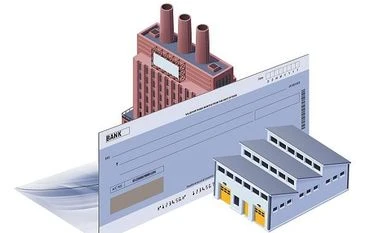A recent note by the ministry of finance seeking views from different stakeholders on whether dishonouring of a cheque should be de-criminalised has led to a raging debate. Bankers and lenders are expectedly opposed to the idea, fearing loss of deterrence, and diminishing sanctity and credibility of cheques as an instrument of transactions. A large section of the business community considers the criminal liabilities and penalties associated with dishonouring of a cheque more as an instrument of harassment by lenders.
The government over the years has been sympathetic to the idea of de-criminalising cheque-dishonour offence, more so in recent months as part of the move to facilitate ease of doing business. Incidentally, the justice delivery system continues to remain clogged with ever-increasing cases relating to cheque bounce —even 32 years after making it a criminal offence.
Legal experts, however, argue that just de-criminalising dishonour of a cheque — and making it civil offence — may not ease the load on the judiciary. It may just amount to transferring the load of pendency of cases from one arm of the judiciary to another. Any move to de-criminalise cheque bounce has to be followed up with massive revamping of the civil court structure. Any salubrious effect on ease of doing business, they fear, may get lost without commensurate reforms in civil courts.
The primary reason for criminalising cheque-dishonour offence was to improve the efficacy of the banking system, points out Amit Desai, a senior advocate who specialises in criminal law. The idea was also to stem the flow of such cases, which were clogging cheque clearing agencies and the civil judicial system.
Accordingly, the Negotiable Instruments Act, 1881, was amended in 1988, incorporating, in Section 138, the punishment of up to two years of imprisonment and fine for dishonouring a cheque. Experts say the criminal deterrence worked to an extent. “In practice, the threat of criminal prosecution does seem to have a deterrent effect and encourages recalcitrant debtors to pay up or settle in a large number of cases,” says Debanshu Mukherjee, co-founder, Vidhi Center for Legal Policy.
Rajeev Dewal, a lawyer who specialises in banking laws, points out Section 138 looked like a short-term solution to a long-term problem. The idea or the need for invoking criminal offence arose because it was taking too long to enforce a commercial contract, including lending contracts, due to pendency of matters in civil courts, he adds.
Experts say converting a civil wrong into a criminal offence, not on principle, but because of practical implementation issues, is weak in law.
Mukherjee points out when an Act is categorised as a criminal offence, the primary burden of investigation and prosecution lies with the State. “When someone fails to honour a cheque in relation to a private commercial transaction, should the entire state machinery (and indirectly the taxpayer) be called upon to support the recovery process?” he asks. Many in the legal fraternity believe the limited government resources should not be used for funding private recovery.
However, the halo of deterrence offered by criminal liabilities in such cases seemed to have dimmed over the years. In 2008, a Law Commission report pegged the figure of pending cases (under Section 138) at around 3.8 million. As recent as March 2020, the Supreme Court noted that there were 3.5 million pending cases related to dishonour of cheque across various courts in the country.
Several countries have over the years de-criminalised dishonour of cheques. The notable ones include the United Kingdom, the United States, and France.
Desai is of the view that the need of the hour is to decriminalise dishonouring of cheques. However, the criminal offence route can still be kept open for lenders and bankers. For bringing in criminal offence charges, they will have to prove deception and cheating by a wilful defaulter in a cheque dishonour case, using the provisions of the Indian Penal Code, he suggests.
Experts agree that while the existing cases can be transferred to civil courts, to avoid the earlier logjam, civil procedures need to be amended. “There is need for time-bound procedures dealing with cheque bounce cases, adhering to strict deadlines. Ensure that the civil court mechanism is strengthened,” says Desai.
Mukherjee suggests taking a humane approach, given the ongoing Covid-19 crisis. He is in favour of invoking personal insolvency laws under the Insolvency and Bankruptcy Code. “It provides a robust mechanism for dealing with such cases that balances the interest of both debtors and creditors and also includes the possibility of 'discharge' wherein some debts can be written-off in deserving cases to enable an insolvent individual to restart his/her financial life,” he adds.
Interestingly, there is no proposal to change any provision of the Payment and Settlement Systems Act, 2007, which covers electronic fund transfer. Dishonouring electronic fund transfer due to insufficient balance in the account is regarded as a criminal offence, and the punishment — as in Section 138 of the Negotiable Instruments Act — can be up to two-year jail and fine. Over the years, the importance of cheques as an instrument of payment and transaction has diminished with the government pushing for electronic modes of payment. The Income Tax Act, too, stipulates that any business with a turnover of Rs 50 crore or more must use electronic modes of payment to avoid tax evasion.
Desai estimates that only around 3 per cent of all payments currently made by industry use cheques for transaction. Given fillip to the electronic payments mode, the growing irrelevance of cheque as an instrument for transaction is there for everyone to see.
Unlock 30+ premium stories daily hand-picked by our editors, across devices on browser and app.
Pick your 5 favourite companies, get a daily email with all news updates on them.
Full access to our intuitive epaper - clip, save, share articles from any device; newspaper archives from 2006.
Preferential invites to Business Standard events.
Curated newsletters on markets, personal finance, policy & politics, start-ups, technology, and more.
)